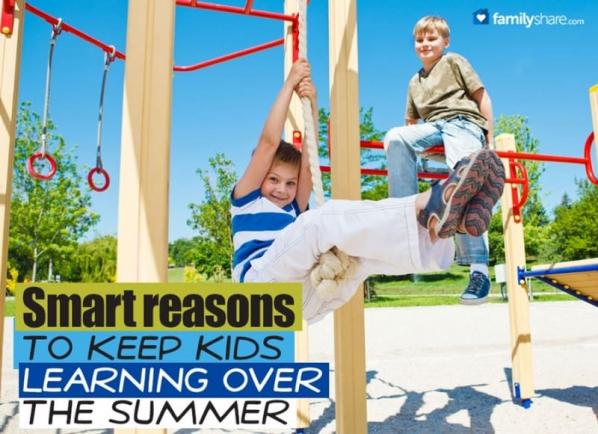
For many kids, their mid-July mantra is "lazy"�- not "learning."� While summer fun is on the daily agenda, some conceptual calisthenics also needs to make it onto the calendar during July and August. If not, your kids will fall victim to a phenomenon known as Summer Slide. I don't know about you, but I worked hard with my daughter on skill building, homework and test prep last year. The idea that we might have to work on the same skill sets again in the fall doesn't sit well with me.
Summer brain drain
On average, kids lose 2.6 months of math skills over Summer Break - some lose even more. Young learners lose, on average, a month or more of spelling skills, the second highest loss in any area.
De-test-able research
While math and spelling typically suffer the worst learning loss, study after study has administered the same test to students at the end of one school year, then at the beginning of the next school year with dramatically lower scores across the board in September than June.
Losses accumulate over the years
Many kids never catch-up to their peers. Losses accumulate year after year, particularly in low-income areas. This eventually results in students performing below their grade level. In fact, unequal summer learning opportunities during elementary school accounts for two-thirds of the ninth grade achievement gap. This can make a significant impact on the universities to which your kids are accepted.
Kids don't want to fall behind
According to the Johns Hopkins University Center for Summer Learning, a majority of students - 56 percent, in fact - want to be involved in a summer program that "helps kids keep up with schoolwork or prepare for the next grade."�
Parents can make a difference
Learning loss is much less pronounced in families that enrolled kids in enrichment classes, visited the local library, spent time reading, or took advantage of other types of low-cost or free learning opportunities. Think of summer learning like a daily "mind muscle"� workout for your kids. It only requires 20-30 minutes per day. Think of it as the daily body workout you do to fend off flab. The rest of their time can be spent on fun activities or relaxing.
It also doesn't need to be dull, boring, or expensive. Kids can work on math skills by adjusting recipes in the kitchen or going to garage sales. They can visit the local library and check out books about subjects that fascinate them while earning rewards and prizes through either local or national summer reading programs. Games like Scrabble, acrostics and other word games can keep spelling and vocabulary skills sharp.
Steve Spangler has an experiment library full of fun ideas to help young science buffs stem summer learning loss. Kidzmet.com emails free learning activities every day during the summer to help kids stretch their body, music, nature, spatial, people, word, and number smarts in fun ways. FunBrain.com has a wide variety of free computer-based educational games that, just like their domain name suggests, are also fun. Check your local newspaper's or parent guide's calendar section for on-the-go learning fun for the whole family.
This Shifts for Students and Parents PDF is also a great reference that highlights how you can help build the skills required of your kids in school.
Finally, thanks to the new Common Core Standards, finding out what your kids should know when they walk through the door on the first day of school this fall is as easy as reading the "what x-grade students should know"� section in the appropriate grade levels below.
1st Grade
2nd Grade
3rd Grade
4th Grade
5th Grade
6th Grade

